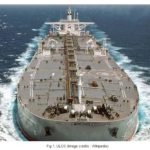
Marine Scrubbers: Yara Marine Plots the Path Forward, Post-COVID-19
MarineLink Oil & Gas Publishers Note: This is an outstanding article from MarineLink. Ina and Shyam nail the Marine Scrubbers issues. Yara Marine Technologies COO Ina Reksten and Research and Development Manager Shyam Bahadur Thapa reflect on the effects of the coronavirus crisis and share their vision for a future beyond the pandemic. 2020 will go down in history as








